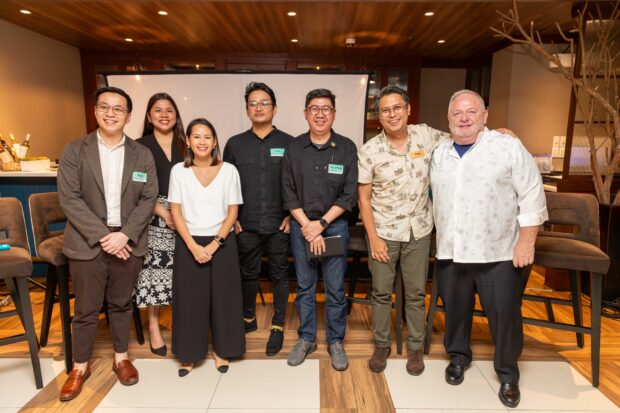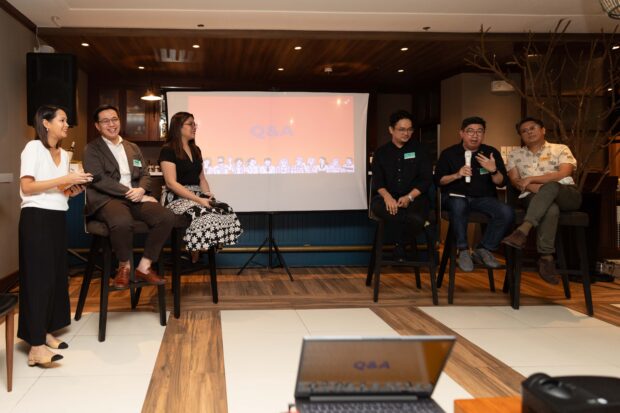Compelling storytelling accelerates PH civil society organizations’ vision of social transformation
In an ever-changing news cycle and communication landscape, the calls for more compelling, collaborative storytelling for social and economic progress are stronger than ever. Evident Integrated Marketing and PR (Evident) recently gathered civil society organizations (CSOs) and media representatives in an event titled “Connect, Communicate, Change: A Mixer with the PH Development Sector” to discuss how working with the media could amplify impact towards addressing social inequalities through effective reporting and storytelling.

Representatives of CSOs discussed how they can collaborate with the media to push for social transformation during Connect, Communicate, Change: A Mixer with the PH Development Sector by Evident Integrated Marketing and PR. IN PHOTO (L-R): Elvin Ivan Uy, Executive Director of Philippine Business for Social Progress; Justine Raagas, Executive Director of Philippine Business for Education; Cecile Dominguez-Yujuico, CEO of Evident Integrated Marketing and PR; Kim Patria, Director for Influencing Gender Norms of Investing in Women; Atty. Jose Andres Canivel, Executive Director of Forest Foundation Philippines; Roby Alampay, broadcast journalist and founder of PumaPodcast; and Paul Bograd, Chairman of Integrated Marketing and PR).
The panel featured Justine Raagas, Executive Director of Philippine Business for Education; Atty. Jose Andres Canivel, Executive Director of Forest Foundation Philippines; Kim Patria, Director for Influencing Gender Norms of Investing in Women; Elvin Ivan Uy, Executive Director of Philippine Business for Social Progress; and Roby Alampay, broadcast journalist and founder of PumaPodcast.
“This is an opportunity for us to emphasize how strategic communication can further empower civil society, especially as we navigate complex public sector challenges where the expertise of CSOs are much needed to help deliver impact,,” said Cecile Dominguez-Yujuico, CEO of Evident who also moderated the discussion. While there is active participation from CSOs to help improve the communities they serve and to contribute to overall nation-building, they face the challenge of communicating their barriers–such as limited resources and the ‘shrinking voice of CSOs in influencing public sector priorities.’ This is where the strategic use of platforms, communities, and media could really support the sector, according to Dominguez-Yujuico.
Given the wide variety of communication channels available—including social media and podcasts—Alampay pointed out that CSOs can leverage these by simply telling their story and communicating their advocacies. “Before you know it, they’re (journalists) the ones telling your story because they saw how you are sharing your stories on your online platforms,” he said. Alampay also shared that the disruption of media paved the way for better ways of measuring the impact of a campaign, with more opportunities for strategic, but also feasible measurement.
The sector’s effort in communicating programs to resolve inequalities remains rooted in their vision of economic and social transformation. However, the Asian Development Bank identifies persistent barriers to economic growth such as the persistence of malnutrition, natural hazards and climate change, lack of access to adequate water and healthcare, and continuous conflict. These roadblocks were reaffirmed by the panelists, underscoring the importance of multisectoral collaboration in ensuring economic progress.

During Connect, Communicate, Change: A Mixer with the PH Development Sector by Evident Integrated Marketing and PR., CSO representatives spoke about the changing communication landscape and how they keep up with this through the utilization of traditional and online media platforms.
Patria emphasized the importance of community-building in advocating for positive shifts in gender norms. Although communication tends to be an afterthought for other organizations, he said that this is a core component of Investing in Women’s social and behavior change campaigns that challenge gender norms and creates more opportunities for women to take on leadership roles in the workplace.
This sentiment was echoed by Canivel and shared that one of the keys to conversation success is strategic communications. “We recognized the importance of the communication component of environment conservation projects and helped build the capacity of our community partners, so they can tell their stories and develop effective advocacy activities,” he shared. Based on the Philippine Development Plan 2023-2028, positive shifts in education are also necessary to build a stronger foundation for collaborative work. “We need to persistently communicate the need for quality education even though it is not a sexy topic to talk about because this will serve as a foundational building block for a productive future workforce,” Raagas said.
All of these efforts to address social challenges can only be effective if they are amplified to reach the decision-makers. Uy reinforced that CSOs would need to communicate with various stakeholders to solve large, complex, and systemic problems, especially those on the local level to make real interventions on-ground.
As media platforms continue to evolve, the panel speakers agreed on the importance of being open to explore them and changing the definition of influencers to reinforce stories that would make an impact that is aligned with their organizations’ vision.
ADVT.